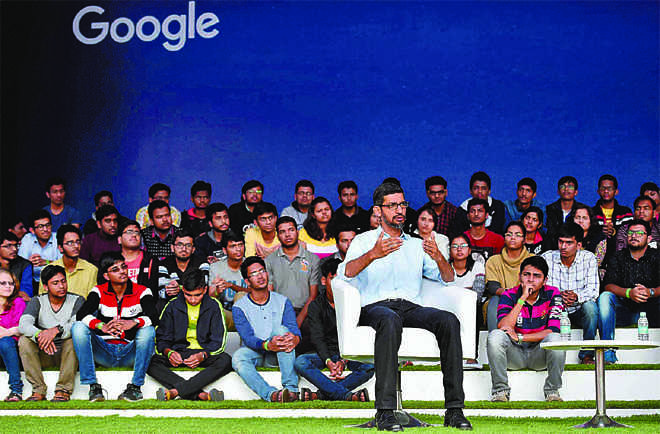
Google CEO Sundar Pichai with students at his alma mater, IIT Kharagpur. Education must bridge the gap between theory & practice. PTI
Meeta Rajivlochan
IN the Age of Knowledge, it is high- order skills and innovativeness that allow for high wages; bookish knowledge on its own has rather limited value. Perhaps, this is the main reason that most professional degrees in India today do not guarantee employability. One recent report even claimed that only 10-36 per cent of software engineers in various metros were employable, while the figures for design engineers were even lower. Learning by the book, or rote learning does not equip students to deal with real-life problems.
Yet it is textbook instruction which continues to be the focus in India's higher education sector. Even where there is project work component in a degree, few students try to find a project that tackles a real-life problem. Of course, there are exceptions. The high brand value to an IIT or IIM degree are proof positive of that. The value of an IIT degree is much less due to the fact of it being an engineering degree and more to the success enjoyed by IIT graduates in a variety of fields, of which engineering is only one. What the IIT really teaches is the ability to think analytically. A plain one-year course in Data Analytics can cost upto Rs 4 lakh these days and it almost certainly leads to a commensurate job.
On the other hand, a routine engineering degree might get someone a salary of Rs 25,000 per month but even that is not guaranteed. MBBS degree holders get a little more than that, but not much. In comparison, those students who graduate in Science/Commerce/Arts from well-known colleges like St. Stephen’s or St. Xavier’s, easily command a monthly pay of at least one-and-half times that of routine degree holders.
What top-level academic institutions offer is instruction in logic, analytical thinking, and the ability to build a reasoned argument. These are the skills that have the greatest value in everyday life. The debate about the commercialisation of higher education does not matter to the economy of education in the least. Perhaps this is why we read in the newspapers everyday about which campuses saw the highest pay packages.
Students do not mind paying Rs 15 to 19 lakh for a two-year MBA course in an IIM while they grudge paying even a miniscule sum of Rs 7,000 per annum for a plain Master of Arts. Today, BA/MA degrees do not really teach how to run a business or how to communicate effectively. Many B.Com degree holders are unable to analyse a balance sheet. Leland Stanford, the founder of Stanford University, famously said that before constructing anything, it is necessary to conceive it. He also said that often technically educated boys do not make the best businessmen; and that imagination and creativity were more important than mere technical skills. Such skills require bridges between knowledge institutions and the outside world. Today in India it is those bridges which are rather weak.
We all know that Bill Gates was a college dropout; what is less well-known is that Gates developed some of his skills in computer programming in high school by using computer time made available by local computer companies which were reaching out to kids to find flaws in their security systems. That kind of interface between knowledge systems and innovation has not yet been worked into our formal institutions. Some corporates do offer internships to students. In recent years, the Government of India and also many state governments offer fellowship programmes to students. But the numbers are minuscule.
What we need is for more and more businesses to engage with the academic community. The second issue is that teachers can teach only what they know. If the top five IT firms in India today spend over Rs 1700 crore every year on training their staff, it is safe to say that all higher education institutions in India put together, do not spend even a fraction of that amount.
In India, we remain more troubled about what are the true objectives of higher education: skills or the higher sort of learning. This debate is about as old as education itself. Ancient Sanskrit texts would tell you that reading books alone cannot equate to learning. Still, the gap between theory and action remained. Perhaps that is the reason that architectural texts like the Mayasara and the Manamata remained far removed fromVedic tradition.
The gap between theory and practice remains. It does not really matter what the cost of any particular course is so long as it teaches the student to deal better with life and learn the most. Once the higher education sector accepts that the goal is to teach real-life skills, especially the ability to think, the rest is simple.
The writer, an IAS Officer Maharashtra cadre, is currently Principal Secretary & Project Director, Rashtriya Ucchtar Shiksha Abhiyan, Maharashtra. The views expressed are personal



























